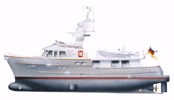
 A
few months into a three-year circumnavigation of the earth, the crew
of the Starship is living the paradox of our time: technological
advances like the Internet and e-mail may give us the illusion of a
small world, but when you're traveling at nine knots, this planet is
huge. Part of the 75-foot vessel's mission is to remind us of that
vastness. The irony is that the crew is relying on technological,
"small-world" advances to bring us its reminder via a Web site
that is updated daily, using Windows 98 and FrontPage 98.
A
few months into a three-year circumnavigation of the earth, the crew
of the Starship is living the paradox of our time: technological
advances like the Internet and e-mail may give us the illusion of a
small world, but when you're traveling at nine knots, this planet is
huge. Part of the 75-foot vessel's mission is to remind us of that
vastness. The irony is that the crew is relying on technological,
"small-world" advances to bring us its reminder via a Web site
that is updated daily, using Windows 98 and FrontPage 98.
Going the distance, yet staying in touch
By being able to connect to someone half a world
away using e-mail, we tend to lose perspective on global vastness.
Starship project founder Michael Poliza puts it this way:
"Distances have been lost with all the communication we have
today." E-mail keeps the Starship crew in touch--not only with
friends and family, but with customs officers in the next
port-of-call, weather services, and people who are following the
voyage through the Web site. The ship's Internet connection provides
access to scientific and research information, and an additional
satellite connection is dedicated solely to monitoring weather
conditions. All this information is vital for the voyage's
intent to explore remote corners of the globe and document rare (and
possibly undocumented) wildlife species.

Out of the box and onto the
boat
The trip is sponsored in part
by Microsoft, with major funding from
Stern, a large news magazine in Poliza's native Germany. A
small team of Microsoft volunteers spent many hours creating a
high-tech, satellite-linked network aboard the Starship. The
easy part was installing the software: Windows 98 came right off the
shelf, just as you would buy it from a software store. The
workstations used to post journal entries and photos to the Web have
no special additions--they run Windows 98 and FrontPage 98 like in a
standard office environment. Of Windows 98, Poliza says, "Some
of the new features certainly make our life easier." Web
integration makes maintaining the site simple, and device support
features come in handy for digital imaging and other peripheral
tasks. Photos come right from the underwater, digital camera to the
Web site in minutes.
Honored guests
are wired as well
Along the way,
several world-renowned scientists and photographers will join the
Starship crew to research and document some of the remote places and
rare wildlife they will encounter. No laptops needed on this trip,
though. Each stateroom on the Starship has a Windows 98 workstation,
and anyone who comes aboard for an extended stay can get an e-mail
address right there on the ship. Because all the software is
familiar, standard Microsoft products, guests can be as comfortable
on board as they are in their offices on land. When ichthyologist
Dr. John E. McCosker joined the voyage to study the multitude of
fish species around Cocos Island, he even did a guest spot in the daily journal.
Touching lives
through technology
From the Web
site's guest book and through e-mail, the crew gets a total of about
80 to 100 messages a day. On some days as many as 300 to 400
messages have arrived, especially after the Starship story has been
featured on a major Web site or television show. Poliza says,
"The feedback is really encouraging and sometimes very
moving." The crew has received e-mail from elderly, sick, and
disabled individuals who keep up with the voyage by reading the
daily updates on the Web. They often express feelings of living
vicariously through Poliza and his shipmates. "They tell us how
much it means to them the belong to our virtual family," Poliza
says. "We never anticipated this kind of strong identification
and bonding."
Opening our
window on the world
Without all the
high-tech connections, the Starship's story would be a different
one. Bill Koszewski, one of the Microsoft volunteers involved with
the project says, "Five years ago they would do the voyage and
then there would be a magazine article. This is much more
interactive, it uses the 'Net to create a new kind of
experience."
When asked how he felt the voyage would be
without the high-tech angle, Poliza says, "Every coin has two
sides. It's become a very public thing and sometimes you think
'Couldn't we just disconnect for a while?' But the positive
overwhelms the negative." Thanks to this connection, the
Starship
is giving those of us stuck on land a closer look at our world.
Photos by Michael
Poliza
